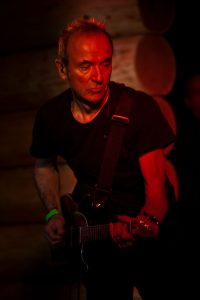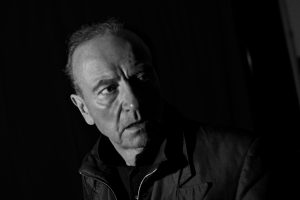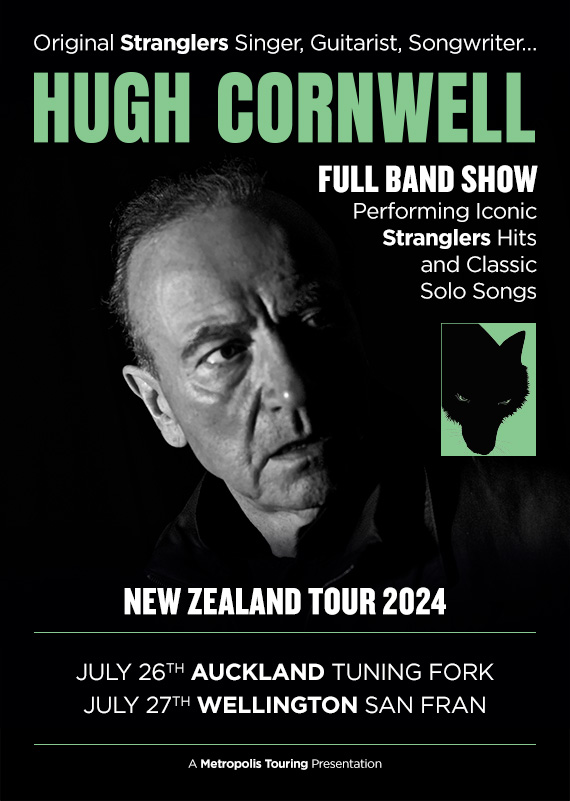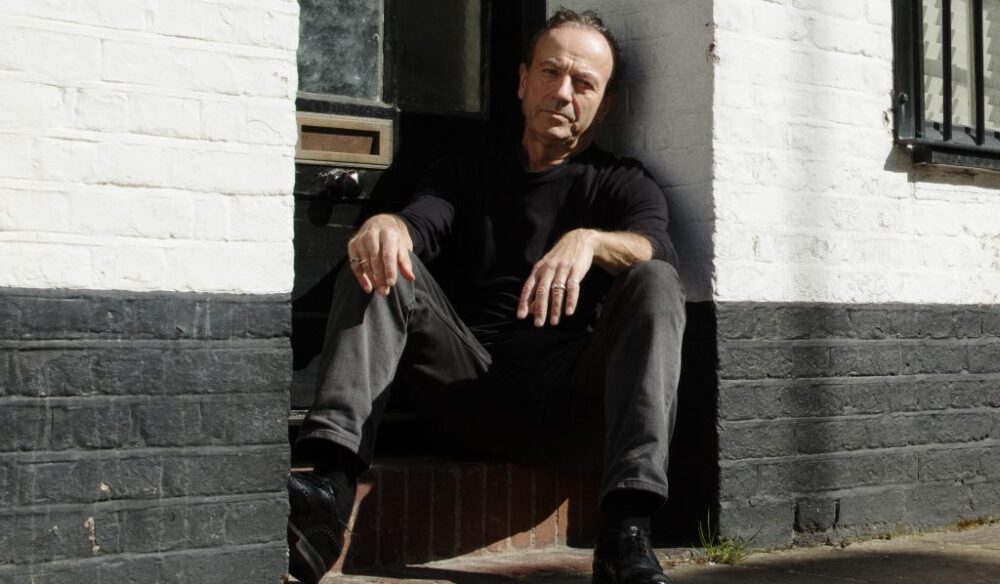Hugh Cornwell Asks Who Wants The World? : 13th Floor MusicTalk Interview
Hugh Cornwell, founding vocalist and guitarist for The Stranglers is bringing his show back to New Zealand later this month. With a live album in the can, he and his band are on a hot streak.
The 13th Floor’s Marty Duda spoke to Hugh who was taking a break from preparing the live album, recorded from shows earlier this year. We found him in the West Country ready to talk about Nosferatu, Captain Beefheart and his old friend, Steve Albini.
Click here to listen to the interview:
Or read the transcription here:
HC: So what can I What can I do for you today?
MD : Well, I understand you got a live album that you kind of been putting together that you recorded earlier this year. So maybe you can tell me about that.
HC : Yeah, it’s been a hard slog, because we recorded the whole tour that we did here in the UK in January, which was eight shows. And there were 24 songs, including encores, there were 24 songs every night It was the same….the set was the same and the encores changed. So it was a mammoth task listening through to everything. I didn’t do it, my sound man, my trusted sound man, Phil Andrews checked it all out and with a few guidelines from me about which which takes were the best. Between us, we picked what we thought were the best takes and then he had to prepare it all. And then it had to be…then we transferred it over to two inch tape at Steve Albini’s studio. Yeah, it’s a very easy process. Dear old Steve. We did it in February, March.
MD: That must have been one of his last projects.
HC: Well, yeah, but I mean, he didn’t personally do it, an engineer there called Taylor did it for him. And then once it came back from there, then it had to be mixed. So it was a long, long process. But finally, and in fact, yesterday, it was mastered completely. Well, we mastered the vinyl about a month ago. You have to do it well in advance to get in the factory pecking order, you know? In the queue to get because everybody wants vinyl. So that was done a while ago. But so the CD and digital was done yesterday and it finally got got put to bed. And thank God for that. I tell you, it would have been easier to have written and recorded a new album. (Laughs) Which I’m going to do next!
MD: Oh, good. Well, that’s good to hear. Cuz I see you put out a video of Who Wants The World, the live version, is that from this upcoming album? If so why did you choose that as one to kind of preview things with?
HC: It’s been a unfairly neglected song from that old catalog. And so we started doing it. And the version stands up pretty well. We thought it was a good calling card, you know, before the album comes out.
MD: Well, because it has political overtones to it…of course that’s kind of what’s going on…the UK just had their election the other day, and the US is heading in that direction. So do you think about those kinds of things, when you’re thinking about what songs you’re going to release in what you’re going to write about?
HC: No, no, no, no, we’re totally independent of that. In fact, I mean, really, Who Wants The World is not political at all, it was the precursor to our thesis about, you know, The Meninblack, it was the first song of The Meninblack era. And if you look at the lyrics, it’s all about, you know, aliens coming to this to the world and, and seeing how…well there’s a slight political reference at the end…and seeing how the planet’s been ruined by man. And the setting sunrise is is a veiled description of a nuclear explosion…that setting sunrise. So really, it’s more about the the old Meninblack scenario. But yeah, it’s in a pretty bad state. So I guess you could say that it’s got political overtones.
MD: A song like that can be read many different ways. And part of it has to do with the times that people were reading into it. So as a songwriter, is that a good thing, a bad thing, a frustrating thing for you to have people reinterpret things depending on their perspective?

HC: No, of course not. The lyrics that I write, or a song that I write, reflects something that I wanted to say, but a lot of the time it’s cryptic. A lot of it is personal so it relates to personal stuff. So I mix it all up and put it in code. And only I know really what’s it about. So, I don’t particularly want to make that…get on a soapbox…and, and broadcast that. So I’m quite happy when people bring their own comprehensions and understandings of the lyrics of the songs for themselves. Because that’s what it’s all about. All it is, it’s an offering to people to lose themselves in some musical sounds. And if it can take them somewhere that means something to them, that’s great. Who am I to say that that’s the wrong thing to do with that song? It’s almost like therapy, you know, I mean, I’m just the social therapists, you know, as a writer, and I offer these things and then people can get some solace from them if they can.
MD: Now, I know you’ve been playing with Windsor (McGivray), and Pat (Hughes), your bass player and drummer for quite a while now. Is that part of the reason that you decided to put this live album out?
HC: Yeah, exactly, exactly. I mean I was asking them the other day, our first gig together was seven years ago…seven, close to eight…and, you know, they’ve got really good now, you know, the three of us have got really good playing together. And they’re very enthusiastic. And hopefully, there’ll be on board for a long time. And a lot of the people at shows, the fans, are saying, ‘God, this sounds great, why don’t you record it?’, you know, and so with the feedback, and the fact that we’ve done it for a while now, it made sense to commit it to tape. And the amazing thing about this lineup is that I can have three voices, because they all, they both sing. You can’t really say ‘they all’ sing with only two other musicians, if it was three, you could say ‘they all sing’. There’s only two, so three altogether. But you know, they love singing. And as The Who demonstrated to us many, many years ago, if anyone’s still remembers a band called The Who, you could really use voices as another instrument, you know, and a lot of the time we do that. We’re working on a rendition of Down In The Sewer, and in that some of the keyboard parts we’re going to be singing them because we don’t carry keyboards. And it’s a way of…you can cover a few more bases with with three voices, which you can’t with two. You know the last line up, I had a drummer, Chris, refuse to sing, although he could, but he refused to. So I just had two voices. And the difference of having a third voice is quite spectacular. It’s like adding a third dimension to it. It’s quite remarkable…the difference between having two voices and three voices.
MD: Now, you mentioned a little bit earlier, Steve Albini…
HC: Yeah, what a shame that was. I mean the poor guy…
MD: I mean, you worked with him on Totem & Taboo as well, and you came back to him, so obviously you liked what he did and how he did it.
HC: Yeah, we kept in touch. You know, we liked working together. And at one stage we were…as much as he hates the working as a producer or with producers, we were talking about actually recording people between us, you know, like as a team. He’d do the technical and I’d be producing and he was quite happy, he was quite excited about doing that. But we couldn’t find any takers. We came close to a couple of artists, who will remain nameless, but then they went somewhere else. But yeah, so that’s testament to how well we got on we understood each other technically and emotionally. You know, it was a good guy. He was a good guy and was taken before his time. But the great outcome, if there is one positive thing from his death, is that his studio is now busier than ever. In Chicago, yeah, everybody is flocking from America and all points in the globe to go to…it’s like his shrine, you know. It’s a great studio. And people are going to record like never before. And they tell us that it’s absolutely packed, which is a good, you know…he would be happy with that.
MD: Now one album that I kind of wanted to touch on, which came out a long time ago was Nosferatu. It came out what, in ’79…you’re still doing The Stranglers thing but you kind of veered off a little ways to this thing with Robert Williams. And I think I heard that you’re thinking about doing some of those songs live.
HC: Well, we’re not just thinking about it. We’ve been doing them! Funnily enough, as time goes on, more and more people are asking about that album. So maybe it was ahead of its time. I don’t know. But we’re doing Big Bug live, which is the first track on side two, and that sounds great. And we’ve been doing Mothra for many years, and we’re working on Wired and Losers In A Lost Land. And, in fact, at some point, it may be possible to actually perform the whole album live. We were toying with the idea the other day. But they do go down a storm, and it’s it’s odd. You know, I’m relearning these songs to play them live, because it wasn’t created as a live scenario, it was a record, you know. So to play it live is a different beast. And you have to put on a different attitude, when you’re listening to it, what bits are the most important bits? And what can we cover? And who can do what? With only three of us. And, and it’s proven to be very interesting. And the dynamics of these works, is quite astounding. And I’m learning… I’m relearning how I was writing that album, if you can see what I mean, so long ago. And I’m actually going to start reincorporating some of the ways of composing that I did on that for the next album. So the next album will be Nosferatu-like.

MD: So what kind of differences in songwriting technique or style did you find?
HC: Well, it’s just that those were really created as pieces of music. And then I made up a sort of lyric and song and top line and melodic bits to fit into what Robert and I had put down as musical pieces. So they they didn’t start out, as you know, song chorus, middle eight, that sort of thing. And so you end up with these strange, strange arrangements, like, I mean Big Bug, if you listen to Big Bug, there isn’t really a verse, there isn’t really a chorus. There isn’t really… some things only occur once in the song and don’t come back. And it makes it very quirky. And it makes it…it’s almost like you’re being taken more on a journey than you would if you were listening to a standard type of song where you’ve got a verse and then you go to a bridge, and then you go back to this. So it’s more of a journey. And I think that sort of appeals to people. It’s the fact that they’re listening to something and it’s taking them somewhere and they’re not, you know, you’re on a train and…like Big Bug’s about Trotsky train. You’re on a trip that when you’re listening to the song, you’re on a train and you’re being taken down this line, and you don’t visit the same station twice, you know, you go on to the next station. And so that’s quite a nice analogy, you know?
MD: Yeah, yeah, and you had some interesting people on it…a couple of guys from Devo, Ian Dury, Mick Jones and the one I was interested in, seemed kind of out of not out of place, but different was Ian Underwood from The Mothers.
HC: Yeah, from Zappa. Yeah, absolutely. Well. Robert had run into Ian and got friendly with him and so guested him on… I think he played briefly on a couple of tracks. And yeah, and The Mothers…our boys, you know, both me and Robert…Robert almost became the drummer of Devo, actually, at one stage because he was so close to them. We were both close to them. Ian, I had great respect for Ian Dury. Who else was on it?
MD: Mick Jones.
HC: Oh, yeah, yeah. Well, The Clash did backing vocals on Puppets and Wired, I think, possibly. Yeah, yeah, yeah, well, I mean, they were in the studio upstairs. I used to hang out in America a bit in the late 70s, when we first started playing there and I loved San Francisco and when I was in San Francisco, The Clash were there, you know, we were hanging out together and I got to know them. I knew Joe (Strummer) anyway, but Mick I didn’t really know. But we got to know each other with Robert and we were all fans of the same thing. We all loved (Captain) Beefheart, you know. And then we went to the Beefheart shows and all of Blondie turned up, you know, so they were fans as well. So when you find these common things that you share, then you become sort of friends.
MD: So whose idea was record White Room? The Cream song.
HC: Yeah, me. You know, it’s always been one of my favorite songs. And it’s got this strange time signature in it as well, at one point in it. Yeah, I’ve forgotten about that. I’ve done that live.
MD: Oh have you?
HC: Yeah. In the past? Yeah.
MD: Because it’s got some great drumming originally by Ginger Baker. And I was wondering what Robert Williams thought of it as a drummer himself.
HC: Oh, yeah. I mean, you know, Ginger was one of the kings. You know, he’s one of the kings of drumming and I had the pleasure to play with him. When there was a Jack Bruce tribute at Royal Albert Hall a few years ago and Ginger turned up and I met him but he wasn’t very friendly. But then he wasn’t very well at the time. But he did play
MD: At least he was there. And that’s pretty cool.
HC: Oh, he was still totally on it, you know, totally on it timewise. He’s one of those greats, you know, he brought something to drumming which is very different. You know, it’s when you get…like Charlie Watts is the same…you get people from another discipline coming into rock the edges change, you know, and they distort the box and suddenly other things start coming in. That makes it much more interesting.
MD: Yes. Or people with no discipline like Keith Moon. Exactly.
HC: Yeah, yeah, yeah, exactly. Yeah.
Hugh Cornwell performs two shows in New Zealand this month:

